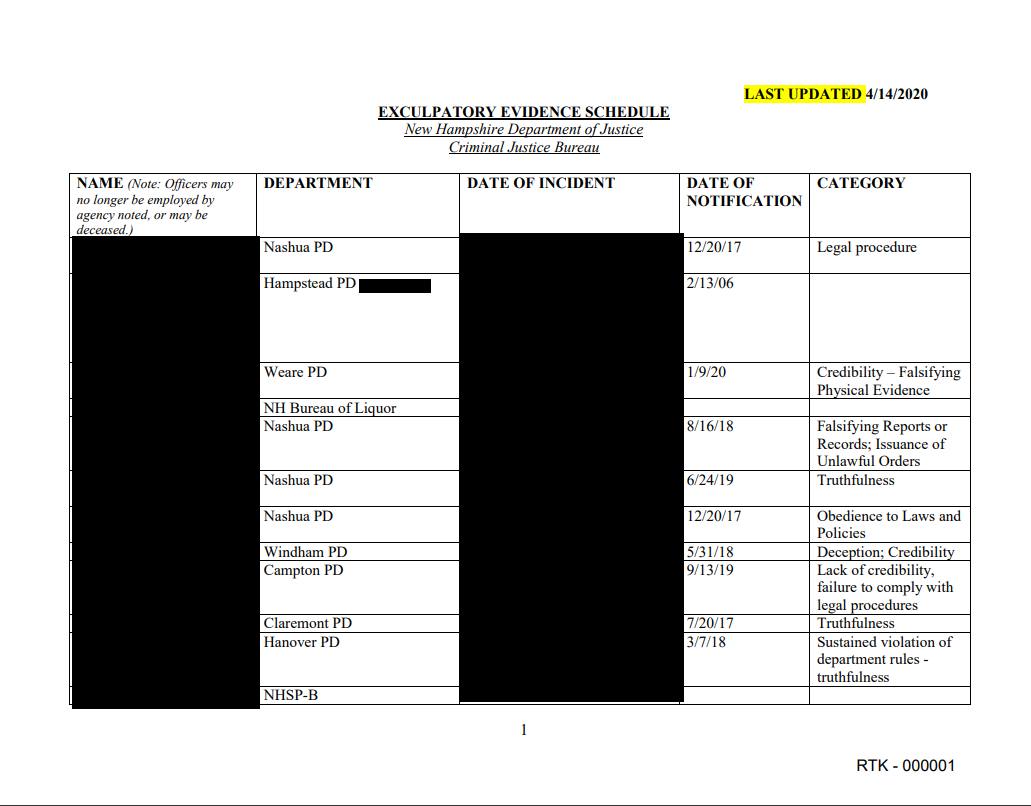By DAMIEN FISHER, InDepthNH.org
New Hampshire Commission on Law Enforcement Accountability, Community and Transparency took a deep dive Friday into Laurie List issues, as the commission begins work on final report to Gov. Chris Sununu.
After finalizing the report on the police interactions with members of the public, the commission heard from John Scippa, the executive director of New Hampshire’s Police Standard and Training Council, which operates New Hampshire’s academy for police and corrections officers.
Scippa, who is also a member of the commission, spoke about how police officers who have violated rules of conduct or even broken the law are investigated by the Police Standards and Training Council. The council certifies police officers in the state and can suspend or revoke that certification depending on the investigation.
Police departments have discretion in bringing some issues before the council, like in cases of dishonesty, but if an officer is charged with violating the law the charging department must inform the council.
“Every time a New Hampshire police department arrests and charges an officer, they must be reported to Police Standards and Training,” Scippa said.
The council will vote on whether or not to discipline an officer by suspending or revoking the officer’s certification. The council will also investigate some resignations where an officer stepped down instead of getting fired. If there is impropriety found, the council will act.
If police chiefs are not following guidelines, like reporting problem officers to the council, there is currently little the council can do, according to Scippa. Currently, the council can ban a department from sending officers to the academy for training, which Scippa said is the wrong way to deal with problem departments.
“That’s the worst way to handle it,” Scippa said.
Scippa would rather get a legal consent decree through the courts to compel the department to come into line, but he is still short-staffed and that would be difficult.
“Which of my two part-timers do I send,” Scippa said.
Scippa is unable to pull together detailed data on the number of officers who have been brought before the council for discipline, since the council lacks the software to handle the information and the state currently lacks a database of such cases.
“The computer record-keeping system is archaic at best,” Scippa said.
Police officers who are found guilty of a rule violation or crime may end up on the state’s so-called Laurie List, now called the Exculpatory Evidence Schedule, according to Robin Melone, president of the New Hampshire Association of Criminal Defense Lawyers.
The EES is a list of officers with problematic backgrounds relative to dishonesty and excessive force, like being caught committing a crime or lying in their official capacity. Information from the secret list of officers who have been disciplined for such infractions, which is now maintained by the New Hampshire Attorney General’s Office, must be disclosed to defense attorneys by prosecutors when an officer on the list is part of a criminal trial.
“I think the system is a mess,” Melone said.
See copy of the most recent list here: https://drive.google.com/file/d/1PumiMcSlQCBqCm9sKkBYNJFUu10GWE8-/view?ts=5f371bab
Individual police chiefs have to add an officer to the list, and it is unclear if every officer who should be on the list is on the list. Melone said it is likely there are officers on the list who should not be there as well. The process for getting on the list lacks transparency and feeds into an appearance that police protect one another at the expense of the public, Melone said.
“There is the appearance of impropriety,” she said. “Community members of color view the list and it’s secrecy as an attempt to protect these officers and it impacts their ability to trust law enforcement.”
A Superior Court judge has already ruled the names of police officers on the secret Laurie List are public, but Attorney General Gordon MacDonald appealed that decision to the state Supreme Court where it awaits oral argument in September.
The commission is expected to hear from more experts as it examines police discipline issues, and Deputy Attorney General Jane Young said the commission will look at qualified immunity for police officers.
The commission members started Friday by finalizing the report on community relations, recommending more training for officers to deal with children, the mentally ill, and members of minority groups. The report also suggests police make more of an effort to recruit minority officers.
Some commission members, like former police chief Eddie Edwards, said there is not a large pool of minority applicants in New Hampshire.
Edwards was skeptical of including the suggestion to hire more minorities in the report.
“If people are serious about this then we should be serious about it,” Edwards said. “I think a lot of this is lip service because when the rubber meets the road very little is done to meet the challenges.”
The first report, completed late last month, recommended changes to the way police officers and academy cadets are training, to include more training on topics like implicit bias.





